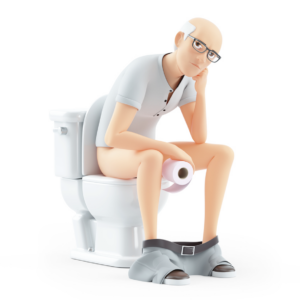Better Be Going: What Is Constipation Doing To You?

Better Be Going: What Is Constipation Doing To You?
November 29, 2023
It’s somewhat of a taboo topic, though we’ve covered it in the past. But as the season of holiday eating and travel comes into focus (both of which can do a number on your digestive system), it’s useful to return to the dilemma of constipation and how to deal with it. If it provides any comfort, you likely know you’re not the only one who suffers. The National Institute of Health estimates that in individuals 65 years of age or older in the community, the prevalence of constipation (defined as having a bowel movement every three days or even less frequently) is 26% for women and 16% for men. This rate increases to 34% for women and 26% for men in those 84 years of age and older. A recent survey of 2000 adults found that 93% of respondents experience occasional constipation and 43% said they experience it often or all the time. Clearly, a good many of us suffer from this uncomfortable and at times dangerous condition.
What distinguishes the occasional bout of constipation from a more serious situation? While everyone has different bowel movement habits, and what’s normal for you may be abnormal for someone else, the longer you go without going, the more likely you are courting trouble. Not pooping for a week is likely a reason to seek out treatment, as are the following symptoms: severe stomach pain, inability to pass gas, vomiting, lower back pain, or stomach swelling, among other symptoms. Moreover, frequent constipation can lead to such problems as hemorrhoids, fecal impaction, rectal prolapse, or even urinary or bowel incontinence.
One other risk from constipation? This summer, at the International Alzheimer’s Conference in Amsterdam, researchers from Massachusetts reported an association between chronic constipation and cognitive decline. This study, involving over 110,000 people, was the first of its kind to examine the potential role of constipation in the aging of the brain. As we learn more about the gut-brain connection, it’s becoming more clear that what goes in your gut can directly affect the health of your brain. This study found an association between constipation and higher odds of cognitive decline, such that those with a bowel movement every 3 days or less had a 73% higher risk of subjective cognitive decline. For more on this study, read here.
So what can you do to get things going? There has been new research suggesting a possible role for probiotics in improving chronic constipation, but the evidence is not yet strong enough to recommend you start a probiotic on your own. Some of the usual causes of constipation can be directly addressed to try to lessen or minimize its occurrence, including insufficient water intake, not enough fiber in your diet, dietary changes, or certain medications. The first steps to ease your symptoms might involve drinking more water, getting more physical activity, adding fiber to your diet, or possibly using an occasional laxative. Very Well Health also recommends some additional food items you may want to add to your holiday meal planning, to proactively lessen the likelihood of problems. So grab some kiwis or apples, or sprinkle some chia or flax on your morning yogurt, and get ready to go by reading here. And click here to read about their recommendations for over-the-counter remedies.







